FOOD AND NUTRITION
at Meredith College
As a food and nutrition major at Meredith, you’ll focus on nutrition, food science, and healthy lifestyles as you prepare for a career as a registered dietitian, nutrition educator or in another aspect of the food industry.
Our Bachelor’s Degree in Food and Nutrition

Students learn to promote optimal nutrition and well-being to individuals and groups. The program fosters a global and holistic understanding of the interrelationships between human nutrition and wellness and food and its systems. Students explore current, relevant issues such as hunger, food science, nutrition, policy issues, and the food industry. They also examine the influence of culture, ethnicity, and religion on food selection, dietary intake, nutrition, and health status.
Many Graduates of Meredith’s food and nutrition major will progress to a didactic program in dietetics, graduate school, or a nutrition-related profession.
Food and Nutrition Programs
A degree in food and nutrition provides a strong knowledge base in the sciences and develops communication, problem-solving, and teamwork skills. Those who successfully complete the food and nutrition major can progress into an ACEND-accredited didactic program in dietetics to become registered dietitians. Graduates can also pursue careers in nutrition education, sales, food service management, public policy and health, or the local and sustainable food industry.
- The food and nutrition major is designed for those who wish to progress into an ACEND-accredited didactic program in dietetics to become a nutritionist or registered dietitian as well as students with interests in community nutrition or other aspects of food science.
- The food and nutrition major requires students to complete 46 hours.
Food and nutrition course descriptions »
Undergraduate course catalogue »
Curriculum requirements and course descriptions are subject to changes with each catalogue.
The minor in food and nutrition requires completion of 19-20 hours, which include 10 hours of core food and nutrition courses and 9-10 hours of elective courses in related topics.
Food and nutrition course descriptions »
Undergraduate course catalogue »
Curriculum requirements and course descriptions are subject to changes with each catalogue.
Why Study Food and Nutrition at Meredith?
- Faculty and staff are invested in your success. They’ll get to know you as an individual and help you learn to build on your unique strengths and interests.
- Meredith’s ideal location near downtown Raleigh and the Research Triangle plus the strong connections between faculty and community partners gives you access to a range of opportunities for professional development and applied learning.
- Meredith’s facilities for food and nutrition majors are among the region’s best. With an on-site organic garden, a state-of-the-art food lab and simulation lab, you’ll enjoy hands-on learning experiences that simulate the environment you’ll work in after graduation.
- Our Master of Science in nutrition and dietetic internship programs are well established and undergraduate students frequently choose to continue their studies at Meredith.
- You’ll benefit from our extensive networks in the nutrition industry, both among professional organizations and Meredith alumnae.
- Examples of student success in Meredith’s food and nutrition major include
- Suzanna Gracyk, ’22, is a Wings student who excelled at Meredith. She has continued her studies in Meredith’s M.S. in nutrition program, with the ultimate goal of becoming a registered dietitian.
- Sarah Massey Hester, ’17, ’19 participated in undergraduate research and completed internships to help fuel her passion for the food industry, then returned to Meredith to earn her master’s in nutrition and complete her dietetic internship. She now works for the Dairy Council.

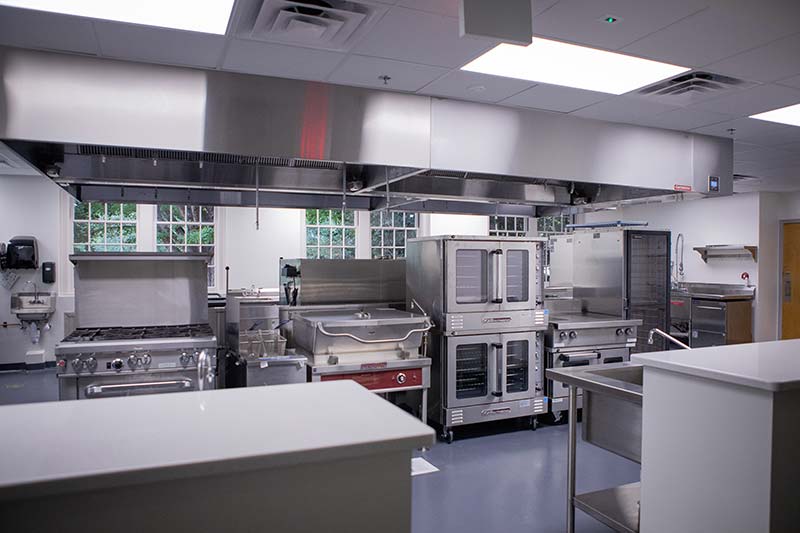
What You Can Do With a Nutrition Degree
Nutrition jobs are expected to grow 11% over the next eight years. At Meredith, you’ll gain the knowledge and skills to thrive in this growing field while supporting health and wellness in your community.
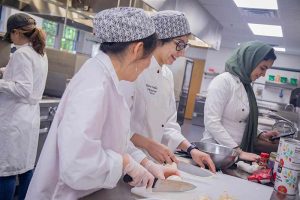
- If you plan to become a registered dietitian nutritionist, after completing your studies as a food and nutrition major you will apply for a dietetic internship and then take a national professional examination.
- The median annual wage for dietitians and nutritionists is $61,650, according to the U.S. Bureau of Labor Statistics.
- A growing aging population will boost the demand for nutritional counseling in hospitals, residential care facilities, schools, prisons, community health programs, and home health care agencies.
- Employment also is expected to grow rapidly in contract providers of food services, in outpatient care centers, and in offices of physicians and other health practitioners.
Those who are interested in nutrition but do not want to become registered dietitians can pursue exciting career paths such as nutrition education with community food and nutrition programs, food security, non-profit work, food systems including local, organic, and sustainability, food marketing and communication, and food policy and advocacy.
Facilities
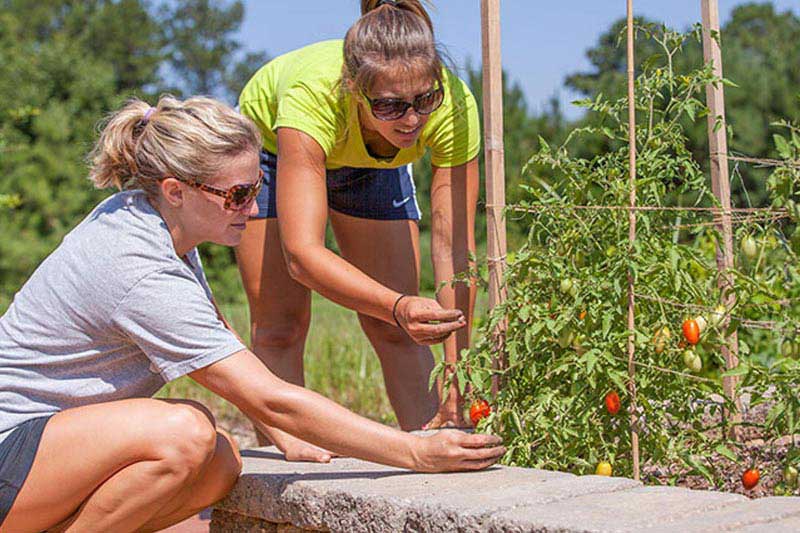
Meredith’s organic garden provides hands-on opportunities to learn about planting, harvesting, and preparing healthy food. The garden is open to all members of the Meredith community for visiting and service year-round. Group work times are scheduled in which garden staff lead service activities such as planting, mulching, watering, weeding, and general maintenance. Interpretive tours are also conducted.
Located in Martin Hall, Nifon Nutrition Laboratory underwent major renovations in summer 2021. The new lab provides students with hands-on learning experiences that will simulate the environment they will work in outside of Meredith in areas such as nutrition education, sales, food service management, and the local and sustainable food industry.
Community Engagement
Meredith’s food and nutrition major offers numerous and varied community engagement opportunities. Examples of such opportunities completed by Meredith students include:
- Interfaith Food Shuttle – Students taught “Cooking Matters” and “Backpack Buddies”
- Urban Ministries – Students developed nutrition education for diabetic clinic clients in both English and Spanish
- Eat Smart Move More NC – Students instituted programs through developing a campus walking map, promoting community-supported agriculture (CSA) on campus, researching the feasibility of a dedicated on-campus lactation space, and creating healthier catering options
- Poe Center – Students worked on nutrition education programs for school-age children to older adults
- Meals on Wheels of Wake County – Students delivered meals to home-bound senior citizens
- Expanded Food and Nutrition Education Program – Students developed nutrition education curriculum materials for a variety of populations
Strong Stories

Kate Jablonski, ’16, was inspired to apply her food and nutrition major to help those with eating disorders.

Lacey Hambridge, ’16, ’18 (M.S. in nutrition) conducted undergraduate research and service projects to help children in need and combat hunger through education.
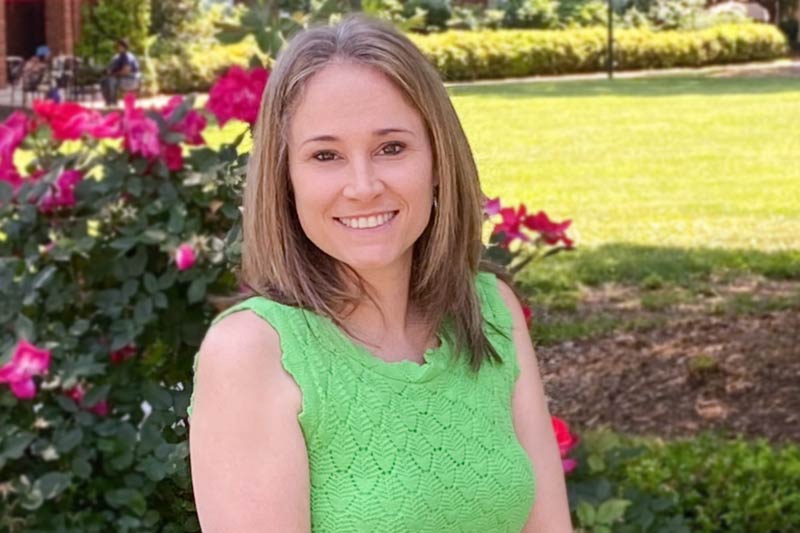
Wings student Suzanna Gracyk, ’22, is passionate about promoting health through nutrition. She’ll continue her studies in Meredith’s Master of Science in Nutrition program, with the ultimate goal of becoming a registered dietitian.
Videos about Meredith's Food and Nutrition Program
The Meredith College Nutrition Lab
The Nifong Nutrition Laboratory provides students with hands-on learning experiences that simulate the environment they will work in outside of Meredith in areas such as nutrition education, food service management, the local and sustainable food industry, and more.
Food and Nutrition at Meredith College
Food for All: Meredith Professors Discuss Food Insecurity
Food and Nutrition News
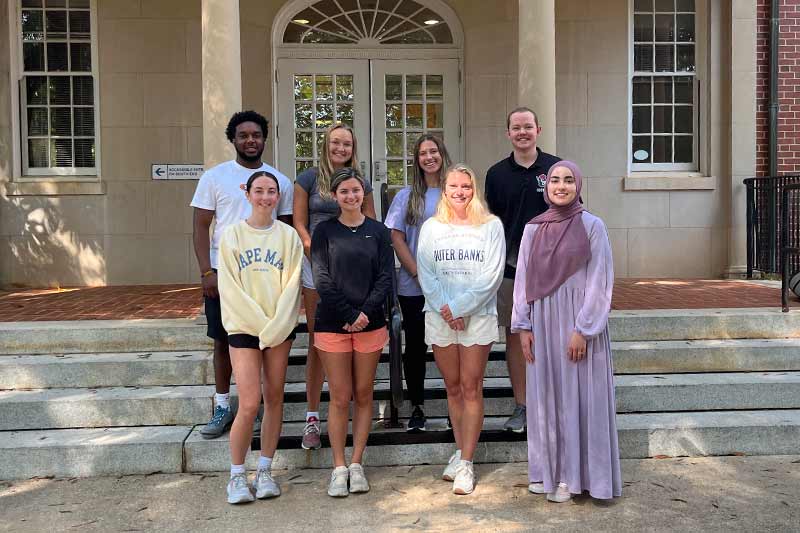
The first cohort of students in the Meredith College Master of Science in Nutrition–Accelerated Dietitian Nutritionist Track (MS-ADNT) began their studies this fall. This track is a newer style of nutrition program that was created by the Accreditation Council for Education in Nutrition and Dietetics (ACEND) to help streamline the pathway toward becoming a registered dietitian.
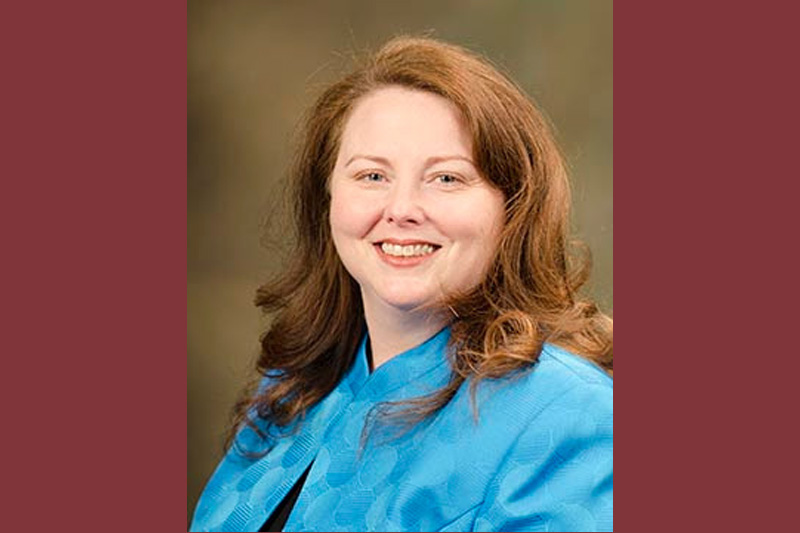
Dr. Sheryl Long has been named the next dean of Meredith College’s School of Education, Health and Human Sciences (EHHS). Her appointment was announced by Senior Vice President and Provost Matthew Poslusny on May 9, 2023.

The Second Annual Angels Are Aware Hunger Week will be held on Meredith’s campus from March 27-31, 2023.
Contact Information
Jennifer McMillen
Interim Department Head, Associate Professor and Program Coordinator, Food and Nutrition
124 Martin Hall
(919) 760-8765
mcmillen@meredith.edu
Nutrition Health & Human Performance Dept. »
School of Education Health & Human Sciences »


